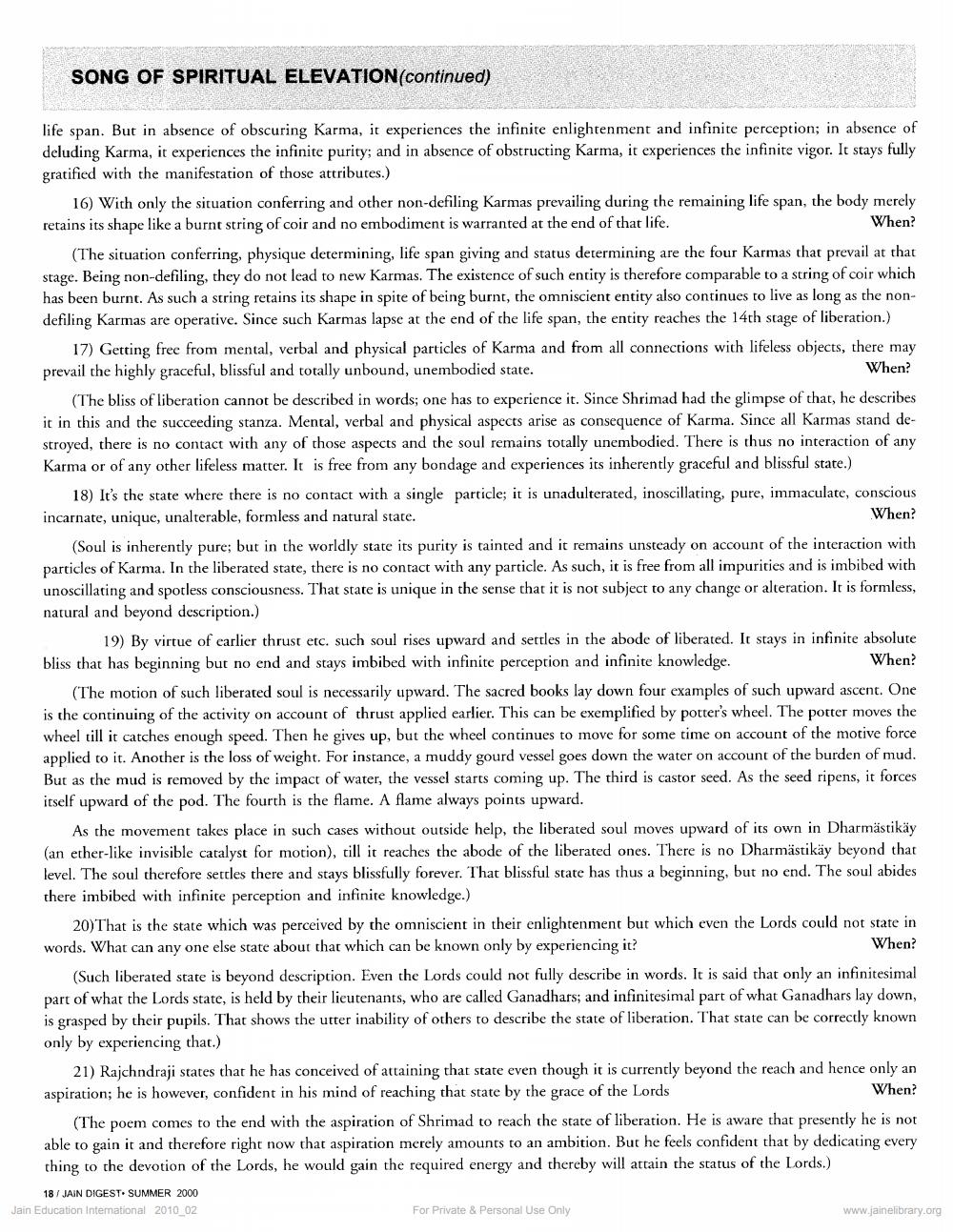________________
SONG OF SPIRITUAL ELEVATION(continued)
life span. But in absence of obscuring Karma, it experiences the infinite enlightenment and infinite perception; in absence of deluding Karma, it experiences the infinite purity; and in absence of obstructing Karma, it experiences the infinite vigor. It stays fully gratified with the manifestation of those attributes.)
16) With only the situation conferring and other non-defiling Karmas prevailing during the remaining life span, the body merely retains its shape like a burnt string of coir and no embodiment is warranted at the end of that life.
When? (The situation conferring, physique determining, life span giving and status determining are the four Karmas that prevail at that stage. Being non-defiling, they do not lead to new Karmas. The existence of such entity is therefore comparable to a string of coir which has been burnt. As such a string retains its shape in spite of being burnt, the omniscient entity also continues to live as long as the nondefiling Karmas are operative. Since such Karmas lapse at the end of the life span, the entity reaches the 14th stage of liberation.)
17) Getting free from mental, verbal and physical particles of Karma and from all connections with lifeless objects, there may prevail the highly graceful, blissful and totally unbound, unembodied state.
When? (The bliss of liberation cannot be described in words; one has to experience it. Since Shrimad had the glimpse of that, he describes it in this and the succeeding stanza. Mental, verbal and physical aspects arise as consequence of Karma. Since all Karmas stand destroyed, there is no contact with any of those aspects and the soul remains totally unembodied. There is thus no interaction of any Karma or of any other lifeless matter. It is free from any bondage and experiences its inherently graceful and blissful state.)
18) It's the state where there is no contact with a single particle; it is unadulterated, inoscillating, pure, immaculate, conscious incarnate, unique, unalterable, formless and natural state.
When? (Soul is inherently pure; but in the worldly state its purity is tainted and it remains unsteady on account of the interaction with particles of Karma. In the liberated state, there is no contact with any particle. As such, it is free from all impurities and is imbibed with unoscillating and spotless consciousness. That state is unique in the sense that it is not subject to any change or alteration. It is formless, natural and beyond description.)
19) By virtue of earlier thrust etc. such soul rises upward and settles in the abode of liberated. It stays in infinite absolute bliss that has beginning but no end and stays imbibed with infinite perception and infinite knowledge.
When? (The motion of such liberated soul is necessarily upward. The sacred books lay down four examples of such upward ascent. One is the continuing of the activity on account of thrust applied earlier. This can be exemplified by potter's wheel. The potter moves the wheel till it catches enough speed. Then he gives up, but the wheel continues to move for some time on account of the motive force applied to it. Another is the loss of weight. For instance, a muddy gourd vessel goes down the water on account of the burden of mud. But as the mud is removed by the impact of water, the vessel starts coming up. The third is castor seed. As the seed ripens, it forces itself upward of the pod. The fourth is the flame. A flame always points upward.
As the movement takes place in such cases without outside help, the liberated soul moves upward of its own in Dharmästikäy (an ether-like invisible catalyst for motion), till it reaches the abode of the liberated ones. There is no Dharmästikäy beyond that level. The soul therefore settles there and stays blissfully forever. That blissful state has thus a beginning, but no end. The soul abides there imbibed with infinite perception and infinite knowledge.)
20) That is the state which was perceived by the omniscient in their enlightenment but which even the Lords could not state in words. What can any one else state about that which can be known only by experiencing it?
(Such liberated state is beyond description. Even the Lords could not fully describe in words. It is said that only an infinitesimal part of what the Lords state, is held by their lieutenants, who are called Ganadhars; and infinitesimal part of what Ganadhars lay down, is grasped by their pupils. That shows the utter inability of others to describe the state of liberation. That state can be correctly known only by experiencing that.)
21) Rajchndraji states that he has conceived of attaining that state even though it is currently beyond the reach and hence only an aspiration; he is however, confident in his mind of reaching that state by the grace of the Lords
When? (The poem comes to the end with the aspiration of Shrimad to reach the state of liberation. He is aware that presently he is not able to gain it and therefore right now that aspiration merely amounts to an ambition. But he feels confident that by dedicating every thing to the devotion of the Lords, he would gain the required energy and thereby will attain the status of the Lords.)
18/ JAIN DIGEST SUMMER 2000 Jain Education Intemational 2010_02 For Private & Personal Use Only
www.jainelibrary.org
When?




